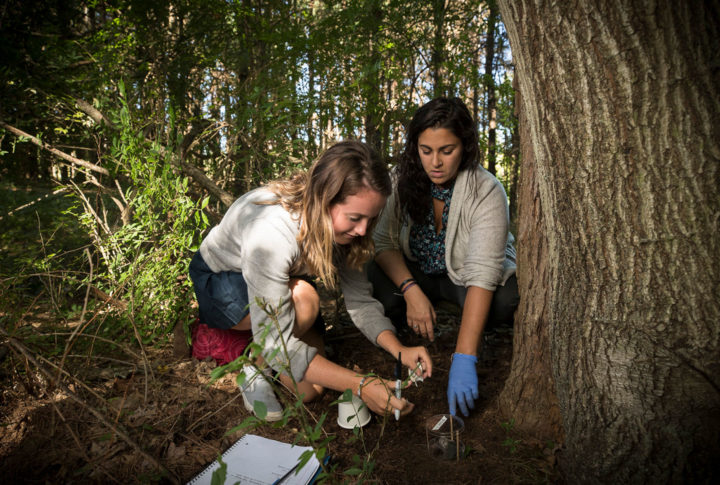
Crowd-sourcing antibiotic discovery. Collaborating with published authors. Leading discussions on social justice and identity. Exploring veterinary science.
Walker’s offers unique courses and programs that combine direct action, experimentation and improvisation with the opportunity to design real-world solutions and gain hands-on experience.
To read more about this year’s course offerings, explore our Curriculum Guide. Please note that not every course runs each year.
Walker’s is among only five high schools in the United States invited to participate in the Tiny Earth Network (TEN), an innovative program formulated at Yale University that encourages students to pursue careers in science through hands-on experience and real-world laboratory and field research. Students from Walker’s join other students from around the world to crowdsource antibiotic discovery. Through a series of student-driven experiments, our girls collect soil samples, isolate diverse bacteria, test their bacteria against clinically relevant microorganisms, and characterize those showing antibiotic activity with the hope of developing new antibiotics.
What does it mean to be a writer? How does an author find her style? The Visiting Writer Seminar is a semester-long course in which students have the special opportunity to immerse themselves in a study of one writer’s works. Throughout the semester, students read a critical mass of texts by that writer before the course culminates with a visit by that person to the school. During this visit, the writer will teach master classes, conduct writing workshops, and participate in class discussions. The writer will also deliver a schoolwide assembly and a public reading to our community.
Inequality in the United States introduces students to systems of social inequality in the United States. Students investigate the structural, interpersonal, and social dimensions of oppression. Course materials explore the ways that racism, classism, sexism, heterosexism, trans oppression, and religious oppression have developed over time as well as the ways they impact each of us every day. Students develop the language, tools, and skills to create positive social change.
Tropical ecosystems contain some of the most diverse habitats on the planet. These systems are both unique and fragile compared to temperate systems, and are threatened by climate change and human activities. This course is designed to provide students with a general understanding of tropical ecology and conservation and to enhance student research skills. Students will be responsible for weekly readings, leading class discussions, presentations and various writing assignments, including a final project intended to increase the breadth and depth of student knowledge of evolutionary ecology in the tropics. By reading, thinking about, and discussing articles from the primary scientific literature, students will gain valuable skills in learning how tropical research is conducted, how scientific research is presented to other scientists, and how to critically evaluate scientific research for both their strengths and their weaknesses.
Advanced Multivariable Calculus covers topics that are not currently included in a traditional high school calculus course but may be included in a college-level calculus course. Students explore topics including but not limited to partial derivatives, double and triple integrals, vector fields, and integration over curves and surfaces.
Virgil’s Aeneid is the central text of Roman literature, and its hero, Aeneas, is at the center of the story. What makes a hero? What makes a leader? In this yearlong course, students explore Roman ideas of loyalty, loss and leadership through Virgil’s text. Through a study of meter, word order, poetic device and vocabulary, the course grapples with the themes of love and death, war and refugees, family, and fate. Students also delve into the politics and propaganda of the Age of Augustus and explore our own relationship to empire and unwanted war. Students express themselves through analytical essays as well as creative projects. Just as Aeneas’ Trojans had to work together to get to Rome, so too is collaboration an emphasis of this class, and students are expected (and assessed) on how well they work together.